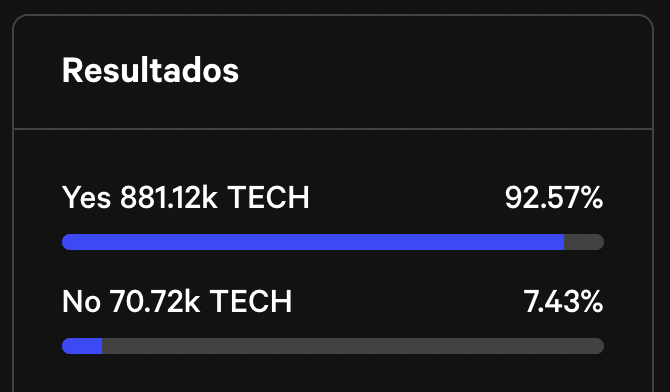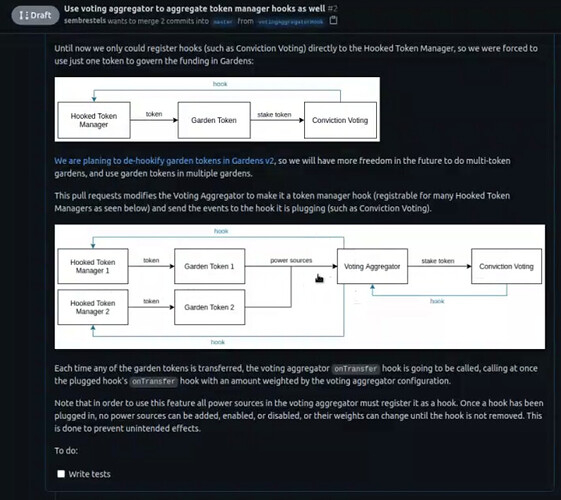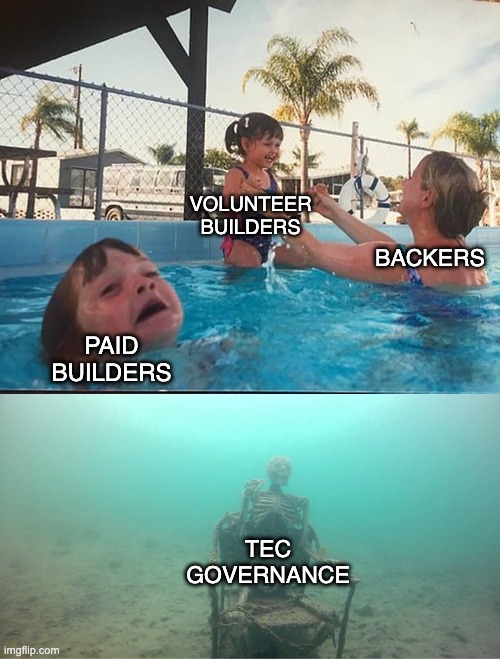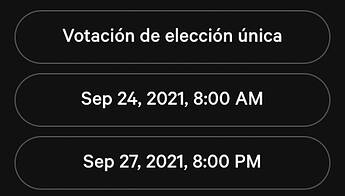I think I could not be more clear: there is not a quick and good solution. I am not going to deploy a change that potentially can lead to a failure of the bonding curve. I already explained why in the previous post.
The good thing is we don’t have to vote as a community on the technical solution, that’s more of a Commons Swarm decision. The vote here is whether its even worth investigating.
In sept 6 Commons swarm call, @sem presented a technical solution (HOOKED TOKEN MANAGER) that could be implemented before the commons upgrade and can be useful until the implementation of multi token gardens. With that part of the advice process more cleared out, I think this proposal is ready to proceed and look for the community’s support to return governance to core members of the project, who had TEC tokens reduced for their monetary compensations.
This vote is proposed to be done on the weekend of September 17-20.
Using Quadratic voting on snapshot
“Do you support the implementation of a technical solution that makes a 75% governance giveback to paid contributors who were deducted TEC tokens previous to the hatch?”
Options: Yes / No
Thoughts from the group conversation today:
-
Weird dynamics could arise…
-
What if some of these people ragequit? They would still have tokens to vote…
-
People who chose to
-
There are other groups who have done this:
-
What if these tokens went to a group of Token Engineers instead… and we had a DAO for them that would be cool! x2
-
Would be better if it was more communal.
Allow me to show strong support the binary yes/no framing and leaving the solution to the experts, aka Commons Swarm, to determine! But, I find myself asking how we determine whether a vote should take place on Snapshot versus the HatchDAO. What criteria should be used?
It seems there might be at least these two criteria which would necessitate a HatchDAO vote:
- Request for funding from the DAO
- Proposal to change the DAO code itself or have significant impact on technical architecture
If we agree this to be true, then this proposal - in which the solution implemented would create a new form of governance-only token - would qualify as “significant change to HatchDAO” and would need to go to Hatch DAO vote.
The Snapshot vote is preferable for all the reasons explained in @liviade’s post on Decision Making but we may be setting a precedent by doing so.
I would vote Yes, and to delegate my Governance Tokens to a Communal Pool. 
It is not a change in the Hatch DAO, but in the Commons DAO, so this decision could be made in the Commons Upgrade vote itself. However, Commons Swarm will also need economic support for building the Hooked Voting Aggregator. We could request 5,000 wxDAI from the Hatch DAO to build this solution, and once the solution is built ratify the decision with the Commons Upgrade vote.
You can delegate your tao voting power to somebody else, or even a DAO controlled by a group of stakeholders (something like a political party?). Delegation is not possible in Conviction Voting, since the dynamic of this kind of voting performs badly without direct democracy.
Thanks for this clarification, @sem. We talked the next steps in the Stewards’ call yesterday and will move forward with a Snapshot yes/no vote (expected to happen from Sept 24 - 27th). A “yes” vote would mean that it will be included in the Commons upgrade vote. This way it will still be voted via Hatch DAO but bundled together with the rest of the parameters for the Commons upgrade.
As Tam states, after receiving feedback from the advice process, we have decided that this vote is going to be held between the 24th - 27th September. I will post here the snapshot vote for everyone to participate. Let’s coordinate with @chuygarcia92 to promote engagement.
*The execution of this proposal will be bundled within the commons upgrade.
Voting type: Quadratic voting (because it continues the implementation of a past decision taken on tokenlog)
"Do you support the funding and implementation of a technical solution that will allow to make a 75% governance giveback to paid contributors who were deducted TEC tokens previous to the hatch?
Options: YES / NO
In my opinion single vote, or weighted voting would give us a better signal since it’s the one the Hatch DAO will use.
Snapshote proposal published! [VOTE HERE]
Following @ZeptimusQ advice, we decided to go with single choice voting, to have signaling from the Hatch DAO distribution.
Dates: 24 september 8AM (GMT-5), ending 27 september 8PM (GMT-5)
Thanks for engaging with this proposal that can help us develop strategies to advance the field and move beyond coin voting governance!
After the latest advices on snapshot, this is the text that will be displayed for the vote:
This proposal is meant to signal the community support for the funding and implementation of a technical solution that will allow to make a 75% governance giveback to paid contributors who were deducted Impact Hours previous to the Hatch
The funding of this proposal will be used to support the Commons Swarm team to develop a technical solution and will cost 5,000 wxDAI that will be requested to Conviction Voting retroactively after the Commons Upgrade.
If this proposal is approved (more than 85% approval rate) the Commons Swarm team will start prototyping a solution to be implemented before the Commons Upgrade. The detailed implementation will be proposed to the Hatch DAO since this solution will involve minting of tokens and be attached to the bonding curve.
The goal of funding this development in the TEC is to effectively return some of the voice that was earned but taken away from core contributors, because of their monetary compensation."
Single choice voting
Options: Yes / No
From the 24th september, to the 27th september
I know this is probably a bit late in the process, but we had a very interesting discussion about the snapshot vote at the close of the Commons Swarm call, and I wanted to put something here for the wider community. @chuygarcia92 shared with us why he voted “No”, and since I think he wanted to write something here too I’ll leave it to him to explain his reasoning in full, but one of the fears he expressed, and which I also share is that in a way this “patching” to amend past mistakes compromises the structure and system of the TEC in a way that makes a clean slate impossible long-term, and this even before we have launched.
At the end of the day, this non transferrable governance power does “tack on” an element of centralization to the governance of the Token Engineering Commons, forever. This feels sadly ironic to me.
I’ve ended up voting in favor of the proposal, because I think it’s important to honor the result of the praise debate vote, but since the actual implementation details are not set in stone,
I wanted to openly float the idea of binding the additional voting power to the vesting period, so that it slowly decreases with time.
This would set a definite end to the consequences of the IH conflict, and guarantee that in the future the bonding curve alone regulates the TEC economy, as was originally intended. Until then, the governance giveback would help adequately honor the sweat equity and knowledge of the people who set it in motion.
I would love to hear your opinions on this, and also get some feedback on if this is technically feasible. I apologize for bringing up something like this so late.
First of all, I’d like to apologize for expressing this so late into the vote. Even though I originally supported this proposal, I have to say I strongly disagree with the possible outcomes. Some key points to my reasoning:
-
This is trying to fix with governance what should’ve been about compensation. I feel that ship has sailed and if we go down this path we’ll just eventually face more trouble around the centralization issues this vote involves. Imagine coming across a DAO whose goals you feel identified with, but having some of its seed members have permanent decision power.
-
Non-transferable governance tokens are like having a CEO in a DAO. I don’t feel both concepts coexist in the same environment. We shouldn’t be able to fix voting power to specific members since this would be closer to a traditional rigged political system, which is everything we’re trying to get away from.
-
Our goal is clear: Advance Token Engineering. Executing this proposal would consume resources and time to achieve what I think is the opposite of advancing anywhere. These resources should be allocated to funding proposals where better TE will be implemented, but I feel that with this situation we’re changing a very clear point that has always distinguished the TEC among other communities: we’re DAOing to DAO instead of DAOing to advance TE.
Again, I’m sorry for bringing this up so late. I have to admit that part of this was because I didn’t really have any ideas for a better solution, however I think @0xNuggan’s approach of a vesting period (even if it’s additional to the currently set period) is something that could work and end the IH discussion once and for all.
Thanks TEC family, love y’all 
I agree with Chuy here. My second thought was that we should implement something that would prevent this from happening in the future.
I could also propose another thing, why not give me and all other contributing members to the TEC a payout for their impact hours commensurate with the amounts given to those who were paid? That is to say, a multiplier of those, since those who were paid gained a LOT of praise since it was literally their job to do so.
I’m not saying we shouldn’t be able to change our minds and revise things after the fact, quite the opposite, but this would seem to go against the spirit of this working arrangement to then shift permanent voting power to the core members who were paid.
You are certain to get praise and impact hours from being paid to do your work in the TEC, so those people who WERE paid should be excluded from those remunerated in the first place.
I can see a much lesser amount- like up to 30% given, but 75% is a LOT.
I didn’t want to give my opinion (since my participation in TEC has been reduced considerably), but as this come up yesterday in the Commons Swarm meeting, I guess it’s worth it to write my unelaborated thoughts here (sorry for doing it in a rush).
I think DAOs should be at the same time innovative organizations that have a lot of capacity to adapt to the new challenges that the world present to them, and resilient and stable institutions in which people can trust, predict, and stay in the long-term.
Both 1hive and TECommons have small groups that organize around strategic goals for the DAO. These groups are spawn when it is needed, and they should disappear when the need they were covering is not present anymore, so people can work then on more valuable things that can make the DAO thrive much more.
At the same time, the common rules for all the working groups and people who is involved in the DAO should be clear, easy to understand, and more or less inmutable over time. In the case of 1hive it is clear: anything that people want be funded has to be voted through conviction voting, whatever it is and whoever it is that is requesting the funds. The emission of new honey is also well established and it is the only way in which it is being created, not benefiting any individual or group.
TECommons is different than 1hive in many different ways, and I don’t think that one model must fit all the cases. I think TEC has to find the way in which it is going to govern itself. What things are acceptable, and which are not.
I think this debate is going to be very important for the long-term sustainability of TEC, in order for democracy not to be abused. As Churchill once said:
‘Many forms of Government have been tried, and will be tried in this world of sin and woe. No one pretends that democracy is perfect or all-wise. Indeed it has been said that democracy is the worst form of Government except for all those other forms that have been tried from time to time.…’
Democracy can foster the tyranny of the majority. This is why having a limited democracy, in which the power of the people is limited to the parameters of a charter, may look like a good solution for an institution like a DAO. Establishing which are the rights of TEC holders, and use governance for anything except for violating the rights of TEC holders. This is why it is that important the TEC covenant that is being discussed in Soft Gov and is going to be used to dispute decisions in Celeste.
Its very interesting to continue having this discussion. The voting round ended yesterday and the results presented 92.57% of approval, but this late signaling should be taken into account.
I feel that this proposal helps to advance the token engineering field by proposing alternatives to coin voting governance and that the governance giveback to core contributors really compensates to people whose governance was reduced due to the IH distribution.
We have the agency to decide how to proceed in this situation. I think that the debate goes more around the technical solution than the governance giveback itself, so i think that Soft gov would be a good place to bring this topic out, also deep dive on it during commons swarms calls, and continue engaging in this forum thread to follow up the course of action.

I also voted no for this proposal for similar reasons to some that @chuygarcia92 and @0xNuggan mentioned. I had expressed my opinion before and I think it’s great to have diverse perspectives in this topic!
The reasons why I like this proposal are:
- The research for a solution that separates gov and financial power in the token design can be an important piece of work for the token engineering field.
- The follow up from no abnormal intervention to make this proposal with work and attention feels great. It shows maturity and accountability to previous commitments.
the reasons I voted no to this proposal is:
- It feels rushed to have something so complex like this be implemented before the commons upgrade.
- It could delay the launch.
- We could be opening cultural problems that our future selves might be mad at us for

that being said, I would still love to see research being done in this direction - of separating gov and financial power in the token modeling and design, integrating it with the bonding curve and so on.
Since this signaling was for the development of a solution by the Commons Swarm team, I really second @0xNuggan opinion. Binding the additional voting power to the vesting period sounds like a very elegant solution.
In regards of @0xNuggan proposal, I understand it today. It’s not about applying vesting to those tokens (so they can be made transferable afterwards), it’s about to burn them after a certain period of time (maybe progressively over time until all of them are burnt).
It is technically feasible by attaching a contract with burn permissions to the Token Manager, so it can burn them progressively over time (during the vesting period or some other period of time decided). This technical solution can be done because the governance tokens are non-transferable and the token holders are few.
I guess that would require a proposal like this one. It should be voted on snapshot before the commons upgrade, and with different options for periods, including “indefinitely” in the options. Avoid the use of the word vesting, as it’s not exactly what it’s done. It’s burning progressively the governance power.


